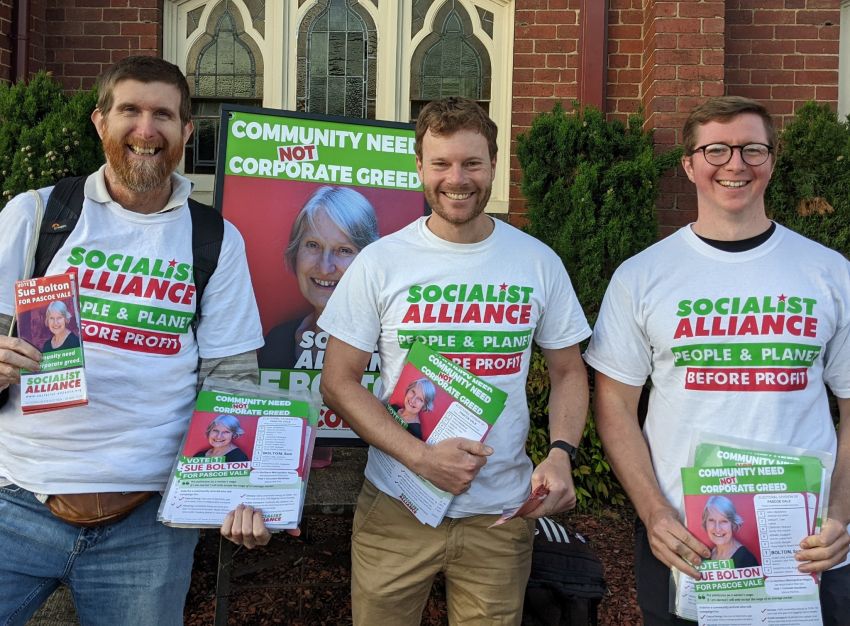
As the cost-of-living and housing crises hit hard, Daniel Andrews’ Labor government was re-elected in Victoria, despite a 5.8% swing against it.
Some of the anti-Labor swing went to the Liberals and the far right. However, socialists and other progressive parties also received a positive swing.
The Liberal Party only picked up one seat from Labor, and the Nationals are reportedly reconsidering their relationship.
The Greens increased its vote to retain Melbourne, Prahran and Brunswick and won a fourth lower house seat in Richmond.
Sue Bolton, Socialist Alliance (SA) Merri-Bek councillor and Pascoe Vale candidate, told Green Left that socialists received significant votes. “The encouraging votes for socialist solutions in working-class areas is a reminder that people are fed up with Labor taking them for granted, while doing little to support them,” she said.
“Labor has underestimated just how difficult this cost of living and housing affordability crisis is for so many working people. It undoubtedly has contributed to the vote for socialists both where we are known as campaigners and also where socialist policies made sense to those who don’t really know us so well.”
Left-wing independent Gaetano Greco received 14.38% in the seat of Preston and has a chance of winning the seat from Labor.
The Victorian Socialists (VS) stood in all 22 seats that cover the two Legislative Council (LC) regions of Northern Metropolitan and Western Metropolitan. The seats stretched from inner city Brunswick, Richmond and Footscray to the outer suburbs of Craigieburn, Werribee and Sunbury.
SA ran a smaller campaign, standing in the Geelong seats of Lara and Geelong and the Melbourne seats of Pascoe Vale and Broadmeadows.
Seats that recorded big votes for VS were: Footscray, where Maribyrnong councillor Jorge Jorquera won 9.77%; Broadmeadows (8.37%); Greenvale (7.15%); Brunswick (8.24%); Northcote (6.76%); Preston (6.28%); Laverton (6.36%); and St Albans (6.78%).
Bolton received 4.48% in the seat of Pascoe Vale, while the VS candidate (at the top of the ticket) received 5.36% giving a combined socialist vote of 9.84%.
In Broadmeadows, the combined socialist vote was 9.47%, a rise of 2.32%.
VS received the fourth-highest vote, out of 23 parties, in the Northern Metropolitan Region, with 4.86%. In Western Metropolitan, it received 3.76%. VS out-polled the Greens in several outer suburban seats.
The Animal Justice Party and Fiona Pattern’s Reason Party (which did not stand in 2018) scored a combined 5.3%. The rest of the swing against Labor went to the right — 6.39% to the Liberals and 4.28% to Family First (which did not stand in 2018). The Greens vote dipped by 0.6%.
Other outer suburban seats were similar to Broadmeadows, with swings against Labor going to the left and the right.
The far right failed to capitalise on the anti-lockdown/anti-mandate movement.
The party that might have tapped this sentiment — The Victorians — imploded a couple of months before the elections. The Freedom Party, Angry Victorians and similar far-right parties scored less than 2% of the vote where they ran.
Legislative Council count
Since Victoria retains the undemocratic group voting ticket system, the so-called “preference whisperer” Glenn Druery tried to maximise far-right parties’ chances of election to the LC by organising them to tightly preference each other, but none received a high primary vote.
Nevertheless, the combined votes of the far-right parties were substantial in Eastern Victoria Region (20.8%); the Northern Victoria Region (20.02%); and the Western Victoria Region (19.8%).
The Liberal Democrats and the Derryn Hinch Justice Party did not win a seat. Bernie Finn, the extreme right anti-abortion campaigner and former Liberal Party member, may also lose his spot.
Renee Heath, who led the Liberal Party’s Eastern Victoria Region ticket, was so transphobic that former leader Matthew Guy said she would be banned from the party room. Leadership aspirants said they would reverse that.
The Greens, VS, Reason, Animal Justice Party and Legalise Cannabis agreed to preference each other before Labor.
The Greens’ vote rose from 10.7% (2018) to 10.9%, not the widely talked-up “Greenslide”. This was smaller than 2010, when they scored 11.2% and in 2014, they scored 11.5%.
However, the Greens’ vote grew in the seats they had already won — and they won Richmond. They are likely to pick up two more upper LC, giving them three seats.
The ABC’s election analyst Antony Green is predicting that the Animal Justice Party will keep an LC seat in Northern Victoria. Legalise Cannabis looks like winning three LC seats. Reason’s Fiona Patten is unlikely to retain her LC seat. Disgraced former Labor MP Adam Somyurek, who ran for the Democratic Labour Party, is predicted to win the last spot in the Northern Metropolitan region.
As we go to press, counting is still underway. According to Green, VS is unlikely to win an LC seat.
[Jacob Andrewartha is a national co-convenor of Socialist Alliance.]